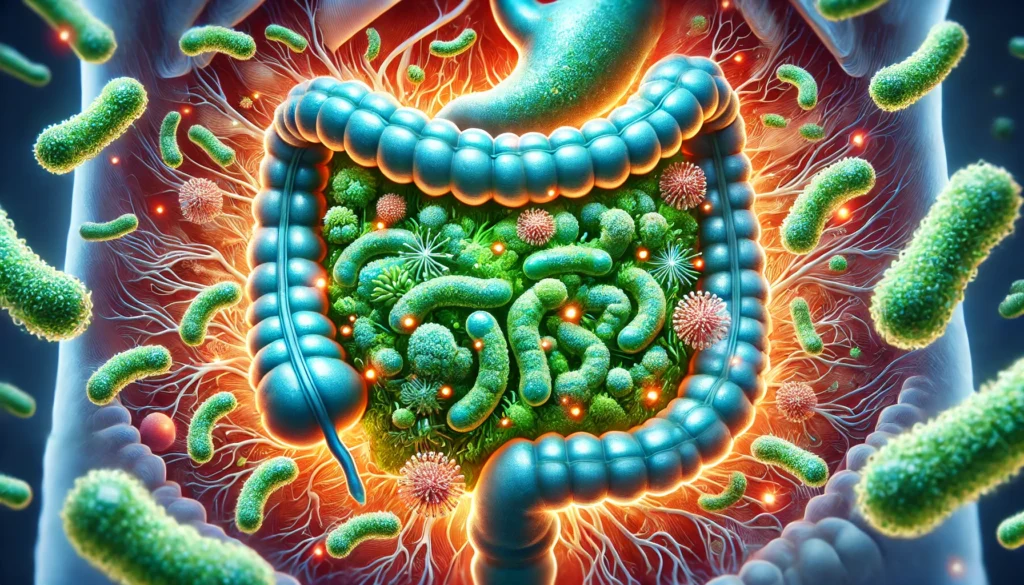Introduction: The Crucial Role of Probiotics in Health
The relationship between gut health and overall well-being has become a pivotal focus in modern medical research. Probiotics, which are live microorganisms that confer numerous health benefits when consumed in adequate amounts, have gained substantial recognition in both scientific literature and popular health discussions. These beneficial bacteria play a critical role in maintaining a balanced gut microbiome, which is essential for digestion, immunity, and even mental health. Recent research has illuminated the deep connections between the gut and the brain, often referred to as the gut-brain axis. This bidirectional communication system suggests that gut health can significantly impact cognitive function, emotional well-being, and even the development of mental disorders.
You may also like: How to Improve Gut Health Naturally: Science-Backed Tips for a Stronger Microbiome
As interest in holistic health grows, more individuals are exploring the advantages of taking probiotics to enhance both physical and mental wellness. The benefits of probiotics for men and women extend far beyond digestion, influencing immune system resilience, hormone regulation, and even neurological function. Understanding how these microorganisms work, their impact on different populations, and the scientific evidence supporting their use is essential for those seeking to improve their overall health. This article delves into the mechanisms through which probiotics influence gut and brain health, explores gender-specific benefits, and provides practical insights into incorporating these powerful microbes into daily life.
Understanding Probiotics: What They Are and How They Work
Probiotics are defined as live bacteria and yeasts that confer health benefits when consumed in sufficient quantities. They naturally exist in fermented foods such as yogurt, kefir, kimchi, sauerkraut, and miso, but they are also available in supplement form. The human gut is home to trillions of bacteria, both beneficial and harmful, that coexist in a delicate balance. When this balance is disrupted—due to factors such as poor diet, antibiotics, stress, or illness—digestive and immune system complications may arise. Probiotics work by replenishing beneficial bacteria, restoring equilibrium, and preventing the overgrowth of harmful microorganisms.
The primary mechanism through which probiotics exert their effects is by enhancing the gut microbiome’s composition. By colonizing the intestines, probiotics help strengthen the gut lining, reducing permeability and preventing toxins from entering the bloodstream. They also compete with harmful bacteria for nutrients and adhesion sites, limiting the ability of pathogens to cause infections. Additionally, probiotics produce metabolites such as short-chain fatty acids, which support gut barrier integrity and modulate inflammation. Given their role in these crucial processes, probiotics have been widely studied for their effects on digestion, immunity, and mental health.
The Gut-Brain Axis: How Probiotics Influence Mental Health
One of the most fascinating aspects of probiotic research is its impact on the gut-brain axis, the complex communication network linking the gastrointestinal system with the central nervous system. This connection explains why gut health plays a significant role in regulating mood, cognition, and overall mental well-being. Emerging studies suggest that probiotics may help alleviate symptoms of anxiety, depression, and stress by modulating neurotransmitter production, reducing inflammation, and influencing the hypothalamic-pituitary-adrenal (HPA) axis.
Neurotransmitters such as serotonin and dopamine, which regulate mood and emotional responses, are heavily influenced by gut bacteria. In fact, approximately 90% of the body’s serotonin is produced in the gut. Probiotics contribute to the synthesis of these neurotransmitters by influencing the activity of gut microbiota. Certain probiotic strains, such as Lactobacillus and Bifidobacterium, have been found to produce gamma-aminobutyric acid (GABA), a neurotransmitter that promotes relaxation and reduces anxiety.
Moreover, inflammation is a key factor in many neurological disorders, including depression. Probiotics help lower systemic inflammation by modulating immune responses and reducing the production of pro-inflammatory cytokines. By fostering a healthy gut environment, probiotics may contribute to improved mental resilience and cognitive function. Research has shown that individuals who consume probiotics regularly exhibit lower stress levels, improved memory, and enhanced emotional stability.

The Benefits of Probiotics for Men
Men’s health can be uniquely influenced by the microbiome, impacting everything from metabolic function to testosterone levels. One of the primary benefits of probiotics for men is their role in digestive health. Many men suffer from gastrointestinal discomfort due to high-protein diets, excessive alcohol consumption, or stress-induced digestive issues. Probiotics help alleviate common issues such as bloating, constipation, and acid reflux by optimizing gut flora balance and improving nutrient absorption.
Another significant advantage of probiotics for men is their effect on immune function. Regular probiotic consumption has been linked to a stronger immune response, reducing the likelihood of infections and inflammatory conditions. This is particularly relevant for athletes and physically active individuals, as intense exercise can sometimes weaken the immune system. Studies have demonstrated that probiotics enhance recovery by reducing muscle inflammation and promoting faster healing after strenuous workouts.
Additionally, probiotics play a role in hormonal balance and cardiovascular health. Some research suggests that probiotics may help regulate testosterone levels by reducing oxidative stress and inflammation. Furthermore, probiotics have been associated with improved cholesterol levels, reducing the risk of heart disease—a leading cause of mortality among men. By supporting gut integrity and lowering systemic inflammation, probiotics contribute to overall metabolic health, making them a valuable addition to men’s wellness routines.
The Benefits of Probiotics for Women
The benefits of probiotics for women extend beyond digestive and immune health, influencing areas such as hormonal balance, skin health, and urinary tract health. One of the most well-documented advantages is their role in vaginal and urinary tract health. The vaginal microbiome is predominantly composed of Lactobacillus species, which help maintain an acidic environment that prevents the growth of harmful bacteria and yeast. Probiotics support this natural defense mechanism, reducing the risk of infections such as bacterial vaginosis and urinary tract infections (UTIs).
Additionally, probiotics may offer hormonal benefits by assisting in the metabolism of estrogen. Gut bacteria play a role in estrogen recycling, which influences menstrual regularity and symptoms of menopause. Women experiencing hormonal fluctuations, particularly during menopause, may find probiotics beneficial in alleviating symptoms such as bloating, mood swings, and hot flashes. Some strains of probiotics have been linked to reduced symptoms of premenstrual syndrome (PMS), suggesting their potential role in supporting reproductive health.
Furthermore, probiotics have been associated with improved skin health. The gut-skin axis highlights the connection between digestive health and dermatological conditions such as acne, eczema, and rosacea. By reducing systemic inflammation and enhancing gut barrier function, probiotics contribute to clearer, healthier skin. Many women find that incorporating probiotics into their diet or skincare routine leads to visible improvements in skin tone, texture, and hydration.

Frequently Asked Questions About the Science-Backed Advantages of Taking Probiotics for Better Mental and Gut Health
1. How do probiotics impact stress and anxiety beyond the gut-brain axis?
Probiotics play a role in mitigating stress and anxiety by regulating the body’s response to external stressors. They influence cortisol levels, the hormone responsible for stress regulation, by modulating the hypothalamic-pituitary-adrenal (HPA) axis. Some probiotic strains, such as Lactobacillus rhamnosus, have been found to enhance resilience to psychological stress. Additionally, probiotics promote better sleep, which directly affects stress management and emotional stability. By reducing systemic inflammation and oxidative stress, probiotics create a more balanced internal environment that supports mental clarity and emotional well-being.
2. What are the advantages of taking probiotics for athletes and active individuals?
Probiotics benefit athletes by improving gut integrity, reducing inflammation, and enhancing nutrient absorption. Intensive training can compromise immune function, making probiotics valuable for preventing infections and promoting faster recovery. Specific strains, such as Bifidobacterium breve, have been shown to decrease exercise-induced muscle damage and soreness. Additionally, probiotics support protein metabolism, ensuring that amino acids are efficiently utilized for muscle repair and growth. Their ability to reduce gastrointestinal distress during endurance exercise further makes them an essential supplement for athletes.
3. What are the unique benefits of probiotics for men’s metabolic health?
The benefits of probiotics for men extend to metabolic regulation by influencing insulin sensitivity and fat metabolism. Probiotics contribute to a balanced gut microbiome that supports better glucose control, reducing the risk of type 2 diabetes. Some strains have been linked to improved testosterone levels due to their role in reducing systemic inflammation and oxidative damage. Men who struggle with metabolic disorders may find probiotics particularly useful in weight management, as they promote fat breakdown and energy balance. Additionally, probiotics support liver health by assisting in detoxification processes and reducing the risk of fatty liver disease.
4. How do probiotics support cognitive function beyond mental health?
Probiotics influence cognitive function by promoting neuroplasticity and synaptic communication. Certain strains produce compounds that enhance the production of brain-derived neurotrophic factor (BDNF), a protein essential for learning and memory. By reducing neuroinflammation, probiotics help protect against age-related cognitive decline and neurodegenerative conditions such as Alzheimer’s disease. Probiotics also improve vascular health, ensuring adequate blood flow to the brain, which is crucial for cognitive performance. Their impact on gut-derived neurotransmitters further strengthens their role in maintaining optimal brain function.
5. What are the benefits of probiotics for women’s immune resilience?
The benefits of probiotics for women include enhanced immune function, particularly in response to common infections. Probiotics fortify the gut lining, preventing harmful pathogens from entering the bloodstream and triggering immune responses. Women are more susceptible to autoimmune conditions, and probiotics help regulate immune tolerance, reducing excessive inflammation. Strains such as Lactobacillus reuteri have been shown to enhance the production of antibodies, improving the body’s ability to fight infections. Additionally, probiotics contribute to hormonal balance, which indirectly supports immune resilience by stabilizing estrogen levels and reducing inflammation-related symptoms.
6. How do probiotics influence gut motility and bowel regularity?
Probiotics regulate gut motility by interacting with the enteric nervous system, often referred to as the “second brain.” Certain strains, such as Bifidobacterium infantis, have been found to enhance peristalsis, ensuring smooth and regular bowel movements. By producing short-chain fatty acids, probiotics support gut hydration and reduce constipation-related discomfort. They also help break down undigested fibers, preventing excessive fermentation that leads to bloating and gas. For individuals with irritable bowel syndrome (IBS) or chronic constipation, probiotic supplementation offers a natural and effective solution.
7. Can probiotics help improve skin conditions and overall dermatological health?
Probiotics positively impact skin health by modulating the gut-skin axis, a complex connection between digestive health and dermatological conditions. Probiotics reduce systemic inflammation, which is often a contributing factor in acne, eczema, and psoriasis. Certain strains, such as Lactobacillus paracasei, have been shown to enhance skin barrier function, improving hydration and resilience against environmental stressors. Probiotics also influence sebum production, helping to balance oily skin and reduce acne breakouts. Their role in supporting gut health indirectly benefits skin by preventing the accumulation of toxins that can trigger skin-related inflammation.
8. How do probiotics contribute to heart health and cholesterol management?
The advantages of taking probiotics extend to cardiovascular health by influencing lipid metabolism and reducing cholesterol levels. Certain probiotic strains, such as Lactobacillus plantarum, help lower LDL (bad) cholesterol by breaking down bile acids and reducing cholesterol absorption. Probiotics also enhance endothelial function, which supports blood vessel elasticity and reduces the risk of hypertension. Their role in reducing inflammation further benefits heart health, as chronic inflammation is a key driver of atherosclerosis. Individuals with metabolic syndrome or a predisposition to heart disease can significantly benefit from regular probiotic intake.
9. Can probiotics help manage food sensitivities and digestive discomfort?
Probiotics play a critical role in reducing food sensitivities by strengthening the gut lining and promoting immune tolerance. Individuals with lactose intolerance, for instance, may experience improved digestion with probiotic strains that produce lactase, the enzyme responsible for breaking down lactose. Probiotics also help reduce histamine responses, alleviating symptoms of food-related inflammation such as bloating and discomfort. Their ability to promote the growth of beneficial bacteria helps balance gut flora, reducing the likelihood of adverse reactions to certain foods. This makes probiotics a valuable tool for individuals navigating food sensitivities or gastrointestinal disorders.
10. What is the future of probiotic research, and how might it expand their benefits?
The future of probiotic research is poised to expand beyond traditional applications, incorporating advancements in personalized medicine and microbiome-targeted therapies. Scientists are investigating next-generation probiotics that can be tailored to individual genetic and microbiome profiles, optimizing their effectiveness for specific health conditions. Additionally, research into psychobiotics, a category of probiotics that influence mental health, is expected to revolutionize the treatment of anxiety and depression. Advances in delivery mechanisms, such as microencapsulation, will improve probiotic stability and absorption. As the understanding of the microbiome deepens, probiotics are likely to play an even more integral role in preventative healthcare and disease management.

Conclusion
Probiotics offer a science-backed approach to enhancing both gut and mental health, influencing everything from digestion and immunity to cognitive function and emotional well-being. The advantages of taking probiotics extend to both men and women, providing gender-specific benefits such as improved metabolic health, hormonal balance, and immune resilience. As research continues to uncover new connections between the gut microbiome and overall wellness, probiotics are emerging as a fundamental component of preventative healthcare. Incorporating probiotic-rich foods or supplements into a daily routine can lead to long-term health improvements, reinforcing the importance of maintaining a balanced and diverse gut microbiota. With the future of probiotic research promising even more personalized and effective solutions, these beneficial microbes are set to play a crucial role in optimizing health and longevity.
gut microbiome health, digestive wellness, probiotics for immunity, mental well-being and gut health, microbiome balance, fermented foods benefits, gut-brain connection, probiotic supplements guide, immune support through probiotics, digestive enzymes and probiotics, stress reduction and gut health, cognitive function and probiotics, gut flora diversity, healthy bacteria for digestion, prebiotics and probiotics synergy, probiotic strains for wellness, holistic gut health, microbiota and mental clarity, probiotics for inflammation control, best sources of probiotics
Further Reading:
The Benefits of Prebiotics and Probiotics on Mental Health
Probiotics: What They Are, Benefits & Side
Is There Evidence to Support Probiotic Use for Healthy People?
Disclaimer
The information contained in this article is provided for general informational purposes only and is not intended to serve as medical, legal, or professional advice. While Health11News strives to present accurate, up-to-date, and reliable content, no warranty or guarantee, expressed or implied, is made regarding the completeness, accuracy, or adequacy of the information provided. Readers are strongly advised to seek the guidance of a qualified healthcare provider or other relevant professionals before acting on any information contained in this article. Health11News, its authors, editors, and contributors expressly disclaim any liability for any damages, losses, or consequences arising directly or indirectly from the use, interpretation, or reliance on any information presented herein. The views and opinions expressed in this article are those of the author(s) and do not necessarily reflect the official policies or positions of Health11News.


